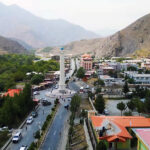The earthquake-affected families of Herat province are still grappling with severe challenges as winter approaches. The United Nations Office for the Coordination of Humanitarian Affairs (OCHA), in its latest report, revealed that 25,000 families remain without adequate shelter a year after the devastating earthquake. With the harsh winter fast approaching, these families face the growing threat of worsened living conditions. Therefore, continued humanitarian assistance and the development of long-term solutions are critical necessities.
During the initial days following the earthquake, various national and international organizations provided aid to the victims. However, OCHA’s report indicates that these efforts primarily addressed immediate needs. Despite this, the issue of adequate shelter for affected families has not been resolved. According to the report, while assistance has been provided over the past 12 months, these families still face severe deficiencies in essential resources needed to endure the winter.
OCHA has emphasized the importance of sustained international aid for Herat’s earthquake victims. With the onset of winter bringing cold temperatures and harsh living conditions to the region, international organizations and the Afghan caretaker government must intensify their efforts. Without proper shelter and essential winter supplies for these families, not only will the lives of the victims be at risk, but the social and economic fabric of the province will also face adverse consequences.
While emergency assistance is vital, it alone is insufficient. Long-term plans and projects to provide permanent housing and facilities for the affected families must become a priority for international humanitarian organizations and the Afghan government. This includes constructing new buildings, finding sustainable income sources for the families, and rebuilding the damaged areas.
Every year, thousands of people worldwide are affected by natural disasters. The global community has a responsibility to assist the victims of such crises. The situation of Herat’s earthquake victims once again highlights that humanitarian aid cannot be limited to initial responses. Instead, comprehensive support and aid programs must be implemented.
In addition to international aid, the Afghan caretaker government has a duty to take serious action in this regard. Addressing the housing issue, providing necessities for winter, and rehabilitating the earthquake-affected areas are responsibilities that the government must consider as part of its obligations. Attracting international cooperation, managing budgets effectively, and ensuring active coordination among relevant institutions are critical government responsibilities in this matter.
The situation of earthquake-affected families in Herat is a stark example of a humanitarian crisis. Their hopes and demands lie in the continuity of aid and the resolution of their persistent challenges. The international community, aid organizations, and the Afghan government must align their efforts within a cohesive framework to restore a sense of hope and stability to these families. Neglecting this situation will not only leave these families to suffer but will also have detrimental effects on societal stability and economic progress.













